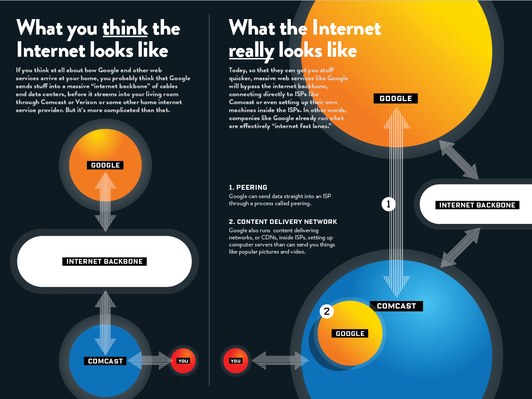R.I.P. Internet?
What every Internet user needs to know about Net Neutrality

January 23, 2018
Net Neutrality was scrapped by the Federal Communications Commission when they repealed it early in the month of December, 2017. Net Neutrality set the rules that addressed a rapidly changing internet. Internet service providers could not discriminate against any lawful content by blocking websites or apps. Service providers could not slow the transmission of data based on the nature of the content, as long as it is legal. Service providers could not create an internet fast lane for companies and consumers who pay premiums, and a slow lane for those who do not.
Many people are very concerned across the nation. They are worried that broadband providers are going to split up the internet. What this mean is that these providers will start to sell the internet in bundles. It is already happening in Portugal. A Portuguese mobile carrier has subscription plans for different internet bundles. Some of these bundles include social media, video, and music. All bundles being priced at $4.99, which isn’t a lot of money, but the fact that providers will make us cough up another five bucks on top of all the rest of their fees will make the public outraged.
A Federal Communication Commission commissioner, Mignon Clyburn, had this to say when she lost the vote to keep net neutrality in place, “The public can plainly see that a soon to be toothless FCC is handing the keys to the Internet, the Internet, one of the most remarkable and powering enabling invention of our lifetime over to a handful of multi billion-dollar corporation. What’s saddens me the most today is at the agency that is supposed to protect you, is actually abandoning you.” A powerful statement, but hits all the correct points.
The American public’s outrage can be seen from miles away. It has certainly gotten the attention of the states. A handful of States such as, New York, Washington, and California have already started fighting back. A coalition of state attorneys general, led by New York, pledged that they would sue the FCC to stop its rollback from taking place. Meanwhile, policymakers in at least two states, California and Washington, said they’d try to make their own plan to prevent companies like AT&T, Charter, Comcast, and Verizon from blocking websites, slowing down web traffic or prioritizing their movies, music and other content above their rivals’ offerings. State legislating is an especially frustrated due to the difficult proposition. The order adopted by the FCC in the month of December doesn’t just kill the existing net neutrality rules. It explicitly seeks to prevents local policymakers from pursuing their own laws. And the FCC’s Republicans on Thursday signaled that they’d relentlessly pursue any states that tried that anyway. Even if none of these state-driven efforts will succeed,it still shows the divisive nature of the FCC’s new decision, voted along party the lines.
More and more states seem to be joining the fight against the Federal Communications Commission. The attorney general of Pennsylvania has offered his support. Iowa has shown its interest also. Connecticut signaled it would fight the Federal Communications Commission in court. To add onto it, states like Massachusetts, Illinois and Oregon said they’d also join the effort to fight the Federal Communications Commission. Meanwhile, in California their local policymakers are forging ahead with their own plans. A state senator pledged to introduce legislation and “step in and ensure open internet access in California.”
If all goes well we should have nothing to fear when it comes to losing our internet memes, Netflix, and all the little things that we all share with each other through the Internet.
